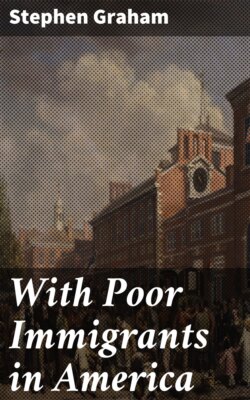Читать книгу With Poor Immigrants in America - Stephen Graham - Страница 8
На сайте Литреса книга снята с продажи.
III THE PASSION OF AMERICA AND THE TRADITION OF BRITAIN
ОглавлениеTable of Contents
I came to America to see men and women and not simply bricks and mortar, to understand a national life rather than to moan over sooty cities and industrial wildernesses. Hundreds of thousands of healthy Europeans passed annually to America. I wanted to know what this asylum or refuge of our wanderers actually was, what was the life and hope it offered, what America was doing with her hands, what she was yearning for with her heart. I wished to know also what was her despair.
On my second day in New York I was deploring the sky-scraper, when a young American lifted her arms above her head in yearning and aspiration saying, "Have you seen the Woolworth Building? It is a bird's flight of stone right away up into the sky, it is higher and newer than anything else in New York, its cream-coloured walls are pure and undefiled. It is a commercial house, to be let to ten thousand business tenants. But it is like a cathedral; its foundations are on the earth, but its spire is up among the stars; if you go to it at sundown and look upward you will see the angels ascending and descending, and hear the murmur of Eternity about it."
I had always thought of the sky-scraper as a black grimy street-front that went up to an unearthly height, a Noah's Ark of sodden and smoky bricks. That is what a sky-scraper would tend to be in London. I had forgotten the drier, cleaner atmosphere of New York.
I went to see the Woolworth Building, and I found it something new. It was beautiful. It was even awe-inspiring.
In the evening I asked an American literary man whom I met at a club what he thought was the raison d'être of the Woolworth; was it not simply the desire to build higher than all other houses—the wish to make a distinct commercial hit?
He "put me wise."
"First of all," said he, "New York is built on the little island of Manhattan. The island is all built over, and so, as we cannot expand outward we've got to build upward. Ground rent, too, has become so high that we must build high for economy's sake."
I remarked on the number of men who lost their lives in the building of sky-scrapers. "For every minute of the day there was a man injured in some town or other of the United States," so I had read in an evening paper.
He said the Americans were playing large, and must expect to lose a few men in the game. He expected the America of the future would justify all sacrifices made just now, and he gave me in the course of a long talk his view of the passion of America.
"The Woolworth Building is only an inadequate symbol of our faith," said he. "You British and the Germans and French are working on a different principle, you are playing the small game, and playing it well. You stake your efficiency on the perfection of details. In the German life, for instance, nothing is too small to be thought unmeriting of attention."
I told him the watchword of the old chess champion Steinitz, "I do not vant to vin a pawn; it is enough if I only veakens a pawn."
"You play chess?" said he, laughing. "That's it exactly. He did not care to sacrifice pieces; he was entirely on the defensive in his chess, eh? And in life he would be the same, hoarding his pennies and his dollars, and economising and saving. That's just how the American is different. He doesn't mind taking great risks; he is playing the large game, sacrificing small things, hurrying on, building, destroying, building again, conquering, dreaming. We are always selling out and re-investing. You are concentrating on yourselves as you are; we want to leave our old bodies and conditions behind and jump to a new humanity. If an American youth could inherit the whole world he would not care to improve it if he saw a chance of selling it to some one and getting something better."
"The spirit of business," I suggested.
"Call it what you will."
"But," said I, "does not this merely result in a town full of a hustling, mannerless crowd; trolley-cars dashing along at life-careless speed; a nation at work with loosely constructed machinery; callous indifference on the part of the living towards those whom they kill in their rush to the goal?"
My new acquaintance looked at me in a way that seemed to say "You—Britisher." He was a great enthusiast for his country, and I had been sent to him by friends in London who wanted me to get to the heart of America, and not simply have my teeth set on edge by the bitter rind.
"You think the end will justify the proceedings?" I added.
"Oh yes," he said. "You know we've only been fifty years on this job; there's nothing in modern America more than fifty years old. Think of what we've done in the time—clearing, building, engineering; think of the bridges we've built, the harbours, the canals, the great factories, the schools. We've been taxed to the last limit of physical strength, and only to put down the pavement and the gas-pipes so to speak, the things you found ready made for you when you were born, but which we had to lay on the prairie. We are only now beginning to look round and survey the foundations of civilisation. Still most of us are hurrying on, but the end will be worth the trials by the way; we
